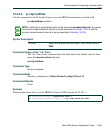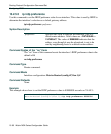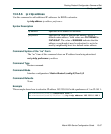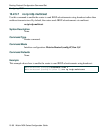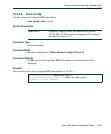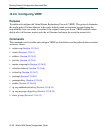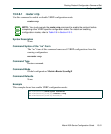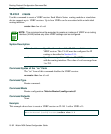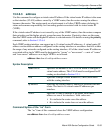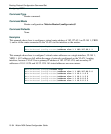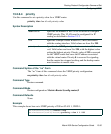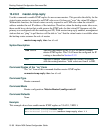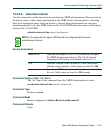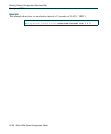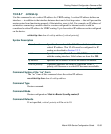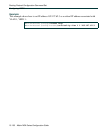
Routing Protocol Configuration Command Set
Configuring VRRP
Matrix NSA Series Configuration Guide 13-93
13.2.6.3 address
Use this command to configure a virtual router IP address. If the virtual router IP address is the same
as the interface (VLAN) address owned by a VRRP router, then the router owning the address
becomes the master. The master sends an advertisement to all other VRRP routers declaring its
status and assumes responsibility for forwarding packets associated with its virtual router ID
(VRID).
If the virtual router IP address is not owned by any of the VRRP routers, then the routers compare
their priorities and the higher priority owner becomes the master. If priority values are the same,
then the VRRP router with the higher IP address is selected master. For details on using the priority
command, refer to Section 13.2.6.4.
Each VRRP routing interface can support up to 16 virtual router IP addresses. A virtual router IP
address can be either an address configured on the routing interface or an address that falls within
the range of any networks configured on the routing interface. All of the virtual router IP addresses
associated with a single VRID must be designated as “owner” or “non-owner”— a mix of “owner”
and “non-owner” addresses on a single VRID is not allowed.
address vlan vlan-id vrid ip-address owner
Syntax Description
Command Syntax of the “no” Form
The “no” form of this command clears the VRRP address configuration:
no address vlan vlan-id vrid ip-address owner
vlan vlan-id Specifies the number of the VLAN on which to configure a
virtual router address. This VLAN must be configured for IP
routing as described in Section 2.3.1.
vrid Specifies a unique Virtual Router ID (VRID) associated
with the routing interface.
ip-address Specifies the virtual router IP address to associate with the
router. The limit is 16 virtual router IP addresses per
interface.
owner Specifies a value to indicate if the router owns the IP
address as one of its interfaces. Valid values are:
• 1 to indicate the router owns the address.
• 0 to indicate the router does not own the address.



